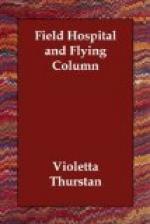I remember one morning when we had only potatoes for the men’s dinner; the cook had just peeled an immense bucket of them and was putting them on to boil when some German soldiers came and took the lot, and this so infuriated the cook that we had to wait hours before we could get another lot prepared and cooked for the patients’ dinner. The water-supply was another of our difficulties. All the watercourses in the neighbourhood were polluted with dead bodies of men and horses and no water was fit to drink. There was a horrible, greenish, foul-smelling stream near the hospital, which I suppose eventually found its way into the river, and it sickened me to imagine what we were drinking, even though it was well boiled.
It was very hot weather and the men all dreadfully thirsty. There was one poor Breton soldier dying of septicaemia, who lay in a small room off the large ward. He used to shriek to every passer-by to give him drink, and no amount of water relieved his raging thirst. That voice calling incessantly night and day, “A boire, a boire!” haunted me long after he was dead. The taste of long-boiled water is flat and nasty, so we made weak decoctions of camomile-tea for the men, which they seemed to like very much. We let it cool, and kept a jug of it on each locker so that they could help themselves whenever they liked.
Some of the ladies of the town were very kind indeed in bringing in wine and little delicacies for our sick, and for ourselves, too, sometimes. We were very grateful to them for all their kindness in the midst of their own terrible trouble and anxieties.
All the first ten days the cannon boomed without ceasing; by degrees it got more distant, and we knew the forts of Maubeuge were being bombarded by the famous German howitzers, which used to shake the hospital to its foundations. The French soldiers in the wards soon taught us to distinguish the sounds of the different cannon. In a few days we knew as well as they did whether it was French or German artillery firing.




